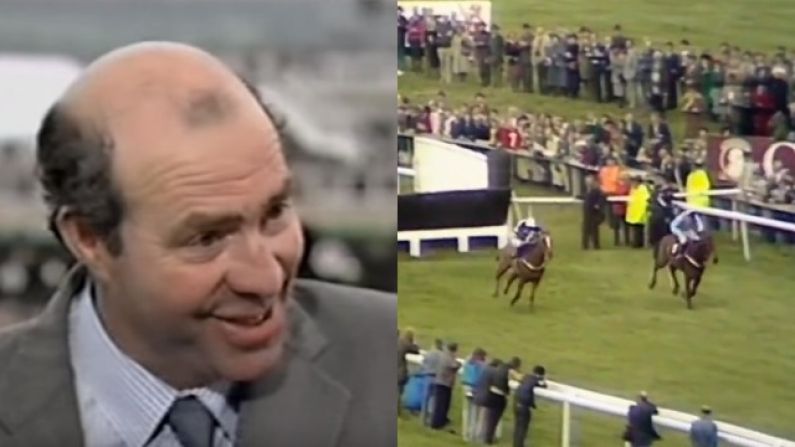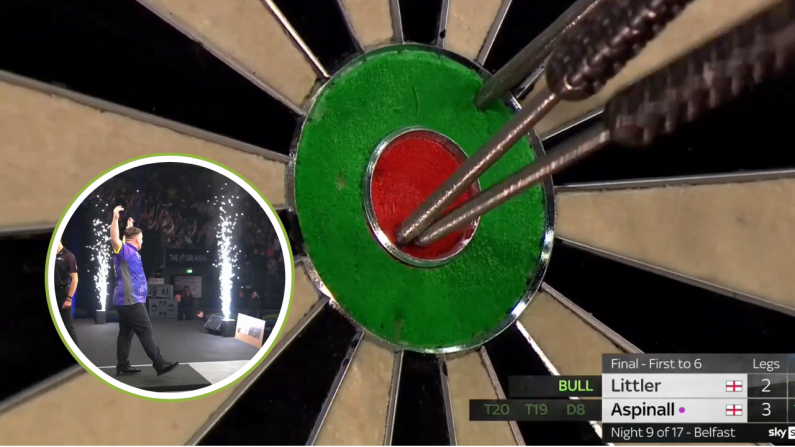"Over 50,000 people came to the Cotswold Hills to enjoy the spring sunshine - and there was the other reason for their visit," said BBC racing correspondent Julian Wilson in his report that evening. "When Desert Orchid walked into the paddock, neither Joan Collins nor Kylie Minogue would have warranted a second glance. Every step, every possible vantage point was crammed to capacity. The arrogant grey knew that he was the star."
Even the assumed processions can be eagerly anticipated, as the crowds under the majestic Cleeve Hill on that spring day will attest to. Desert Orchid, the four-time winner of the Kempton's King George VI and the reigning Gold Cup hero, was expected to reproduce that familiar trick of his on Thursday, March 15, 1990, and so the crowds dutifully descended on the hallowed venue to watch the great grey gelding of the time. No other name could draw quite the crowd.
Bonanza Boy, Toby Tobias and Cavvies Clown were expected to prove doughty opposition, though neither of them could have been accused of troubling the venerable legacy of the star attraction - a genuine equine superstar, one of the few names that could attract masses like a shoal of fish to bait, his mere attendance on raceday found to be the best advertising a Racecourse could wish for. And he biggest day in the calendar was certainly no different.
Norton's Coin alongside Desert Orchid en-route to winning the 1990 Cheltenham Gold Cup at 100/1 pic.twitter.com/6jgnNgKf8K
— Racing Tales (@Racing_Tales) January 10, 2019
On this day, as Dessie's faithful streamed into the formidable racing theatre, there was a sense of everybody else accepting their fate, of being happy to make the most of the day, satisfied to bathe in the vicinity of greatness. Being present was a blessing. For returning before the crowds was an icon whose name, it had already been known, would stand the test of time, one of those that would be used as a barometer to test the credentials of future stars.
Sirrell Griffiths, a dairy farmer from Wales, was no different to any punter funnelling through the turnstiles on that sun-drenched afternoon, though seeing one of his yard's three residents line up alongside the pristine grey under Richard Dunwoody must surely have been the stuff of dreams for a man more accustomed to the point-to-point scene. It was perhaps inefficiency on his part that landed Norton's Coin in the 1990 renewal of the Gold Cup after the small-time trainer missed the deadline of a more appropriate race a week out from the event. He had been out at the local market during the morning only to realise the deadline for the Mildmay of Flete Handicap Chase had passed by the time he sauntered back in through the door.
Years later, the esteemed racing journalist Alastair Down recounted a call he made to Griffiths house the night of his fateful blunder. The Sporting Life journalist, a self-proclaimed connoisseur of Festival handicaps, had taken note of Norton's Coin performance in the Lechlade Handicap Chase the previous January at the same venue and subsequently pencilled him in as his fancy for the Mildmay of Flete. The evidence, in Down's view. was concrete. Norton's Coin was a "good thing."
So, it being a quiet night at the publication's offices, he picked up the phone and rang the household of the dairy farmer enquiring if everything was in working order ahead of the race.
"He's better than ever," Down was told - only for the unwelcome appendage to follow.
"But don't worry, he's in the Gold Cup and will run in that."
The journalist listened in horror, knowing his advice to friends and family had already began percolate far and wide, his reputation going before him. He had seen enough to know Norton's Coin had more than a puncher's chance in the Mildway of Flete, and though the race can be a mire of confusion for even the most seasoned of punters it didn't deter Down.
But the Gold Cup is incomparable to a handicap, even one as prestigious as the Mildmay of Flete. Just as plundering a hat-trick down the park hardly warrants a spot in a World Cup final.
"I blush to recall the things I called that blameless man after I slammed the phone down," Down wrote in the Racing Post in 2011. "But 'Welsh idiot', 'finish last' and 'shouldn't have a licence' were easily the most polite."
The best Griffiths would now hope for was a top-six finish, which at least would guarantee him his entry fee back. Even that was a long shot for a horse that went off at 100/1, after being as long as 200/1 on the morning of the race. A significant slice of luck, of perhaps Foinavon preportions, would be needed in racing's blue riband if the farmer was to return home with some sort of prize to show for his excursion.
What eventually happened on that spring day after 3.30pm defied everything we knew about racing, the procession of game's biggest star turning into the most unpredictable result in the long history of the Festival, a story to match the exploits of Arkle and Dawn Run and the peerless Golden Miller. For as exhilarating as it can be to witness the greatest in the flesh, the triumph of an underdog can be an intoxicating sight.
Not even Griffiths could anticipate the plot of the day.
Realising that the prospect was going to miss out on taking on runners of his assumed ilk, Griffiths told BBC Sport in 2015 that he was angry with himself for days after the initial missed deadline.
"He would have had a nice weight in the handicap and a really good chance," he said.
I never had any ambitions and was quite happy just working with the horses at home and having the odd runner in a race.
Whichever way you looked at it, the trainer's label as an underdog could not have been overstated. On the morning of the 1990 Gold Cup he milked his cows before driving his horsebox the 130 miles east to the centre of the jumps racing world.
All concerned were sticking to the script of the day as the race approached the final bend and the strenuous climb up to the finish, Desert Orchid and Toby Tobias disputing in front, Norton's Coin expected to wane as he laboured through the final furlongs. A parabola of a jump at the penultimate fence however illustrated a runner with a limitless tank and let jockey Graham McCourt know that he could set off to work. He encouraged his ride up in front of the awe-struck crowds where Griffiths' dream was now coming to life.
He'd later admit that he had dreams of the result before the race, his thoughts correctly predicting all horses to enter the frame. Still, he would've been pinching himself as his watched his own silks - he also owned the horse - breeze to victory on National Hunt's biggest stage.
Today’s pic of the day. Norton’s Coin winning Gold Cup in 1990. The longest-priced winner of Gold Cup #TheFestival pic.twitter.com/MUM7dzVsZn
— CheltenhamRacecourse (@CheltenhamRaces) February 15, 2014
Norton's Coin had his day in the sunshine, both literally and figuratively, and though he never won under rules again it never really mattered. The name lives on and the memories of that day still burns for Griffiths, the burly Welsh farmer who, without the required staff or all-weather gallops, rode out his star every morning, over the idyllic hills around the village of Carmarthen which ultimately proved an ideal preparation.
Silver linings aplenty in the dark cloud hovering above Down only a week earlier.
Later that night, as Griffiths returned the winner and horsebox back to the Southwest coast of Wales, Down received a call from one of the friends he had advised in the lead-up to Cheltenham.
"Alastair, you're some genius," he said. "Two hours ago I walked into the White Bear at Shipston and fulfilled a lifelong ambition of buying everybody a drink, including the 230 Irish visitors who stay here and run the beds in shifts between poker games. There isn't a bottle of champagne left in Warwickshire."
Next Friday afternoon will see the 2020 bottles of champagne claimed. But despite the glee with which the winner will no doubt be received, no runner will stoke as much shock as the one that lived among dairy cows in a small Welsh town of Carmathen.













